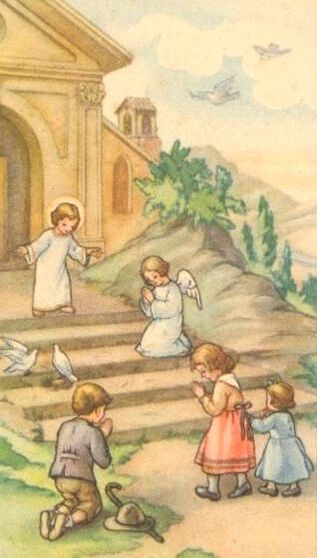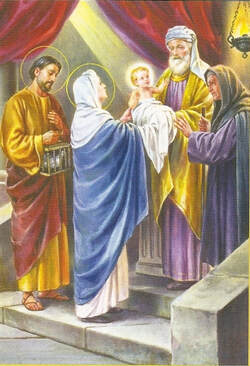
My dear Children:—The Holy Ghost whom our dear Lord promised to His apostles in the gospel of this day must be a Spirit of Truth to us; we must love truth and hold firmly to it, and hate and shun nothing so much as untruth and lies. Do you not know that your hearts are the temple of the Holy Ghost and that an untruth or a lie should never proceed from the mouth of a Christian.
And yet lying is a widely spread vice even among Christians. Parents and children tell lies, the rich and the poor, the high and the low, all tell lies; and without fear of contradiction, I may say that there is hardly one amongst us who would not lie if he said that he had never lied. The reason is because people make no account of lying, and look upon it as an excusable fault.
The devil has played the lying game all the time and he who tells lies is a confederate of the devil. Our Lord Himself calls liars children of Satan. St. Ambrose says: "All who love lies are children of the devil, not by nature but by imitation."
A little child of nine years of age was one day weeping bitterly. He had committed a fault by taking something which his father had told him not to touch, and he was afraid that his father would come to know about it, and punish him. The servants of the house who saw him weeping, and who knew the reason of his tears, said to him: "If your father asks you if you took it, you have only to deny it, and you shall not be punished." But the good child, looking at them with much indignation, answered: "What is that you tell me to do? Tell a lie about it? No, never! I would rather be punished a thousand times over than think of doing such a thing. I will never commit such a sin. I do not claim the devil as my father, for he is the father of lies." This should be the answer of every Christian child to anyone who asks him to tell a lie.
You must not tell the smallest He even to save the whole world, for it is better that the world should be destroyed than that God should be offended. Much less, then, should you tell a lie to save yourself from a scolding or beating, which are intended for your good. If you have done wrong, be sorry for it, then you are soon forgiven both by God and your parents; whereas if you try to hide it by a lie, you are guilty of a fresh sin, and one often much greater than the one you first committed.
To tell a lie, is to say a thing that we know to be untrue. If we believe that we are speaking the truth, and happen to be mistaken, it is not a lie; on the other hand, if we say what we believe to be false, and it turns out to be true, it is really a lie in the sight of God. All lies are sinful, because they are directly opposed to the Divine Truth, which is one of the most admirable perfections of the Almighty. Moreover they are an abuse of that most excellent gift of speech, which God has given us to enable us to make our thoughts known to our fellow men; whereas the liar uses his speech to conceal his thoughts and deceive his neighbor.
St. James, the Bishop of Nisibis, travelling one day through the country, was accosted by a beggar to give him an alms to bury a companion who he said had just died by the wayside. The Bishop gave him an alms and went on, praying for the poor man's soul. The beggar, laughing at his success in imposing on the saint, ran back to his companion, who was lying on the ground pretending to be dead. On coming to the spot, he called to him to get up, as the trick had been successful, but he received no answer. He approached nearer, and took his companion by the hand in order to arouse him, but what was his horror at finding that he was really dead. Immediately, with loud cries and lamentations, he ran after the saint, and, throwing himself on his knees before him, acknowledged the deceit which they had practiced, and implored his pardon and intercession.
The servant of God having first reproved him for his sin, betook himself to prayer, and the unhappy man, who had provoked God to deprive him of life, was restored to life at the prayers of the saint.
Although all lies are sinful, they are not all equally sinful; some are much more grievous than others. The worst lie of all is that which is told in confession by him who conceals a sin, for such a lie is a sacrilegious lie, a lie told to God Himself, and is a profanation of a holy sacrament. The lie next in guilt is that which is told to injure our neighbor's character; for example, when a person gives false testimony in a court of justice, or when he spreads abroad calumnies against his neighbor, accusing him of crimes which he never committed. Such lies are called malicious lies, because they are told through malice on purpose to injure others, and they are very grievous sins. But there are other lies which are much less in guilt, namely lies of excuse and lies of jest. These are sometimes called by foolish people white lies. It is true that they might not cause our neighbor any injury, but still they are displeasing to God and hurtful to the soul. By these jocose lies a habit of lying is formed, which is the foundation, of many vices. If the child is a habitual liar, depend on it that, if not cured of this vice in time, he will grow up both a hypocrite and a thief, for truth is the twin sister of candor and honesty. Children, to tell a lie to excuse yourself is an act of cowardice, and shows a weakness of character and principle, which may well cause us to fear that such a soul will soon fall a prey to the devil. Be always, then, my dear children, most exact in speaking the truth, and pray to God to give you a great love of this excellent virtue which is so pleasing to Him. Remember that if you love and always speak the truth, you are in a special manner the children of God, who is the divine Truth. St. Paul tells the Ephesians to put on the girdle of Truth.
That is the first thing that a man wants to know about a boy. Is he truthful? It is the one thing that we want to know about every girl. Does she always speak the truth? A great educator once said that it did not make any difference how ignorant a child was. He could be taught. It made no difference if he was ill-mannered. He could learn to be a gentleman. But the child that cannot tell the truth is hopeless. There isn't anything to build on. It is like laying the foundations of a house on the sand. It will not stand.
So, boys and girls, when you go out to fight the battle of life, be sure, first of all, that you have on the Girdle of Truth. Yes, dare to be true. Be brave enough to speak the truth, for it is an act of true courage. Your parents or teachers may punish you, but they will respect and trust you, the saints and angels will look down on you with approval, God will hear and will reward you. Nothing can need a lie because nothing can excuse it—"truth will always out." In conclusion what is more contemptible than the character of a liar, whose word is never taken, whose denials are never believed, whose promises are never trusted ? On the contrary, what is more noble, what more amiable, than the character of a child who is always candid, truthful, and sincere? Such a one wherever he goes, carries with him the esteem, the confidence, the respect of everyone.
Source: Story Sermonettes for the Children's Mass, Imprimatur 1921



 RSS Feed
RSS Feed